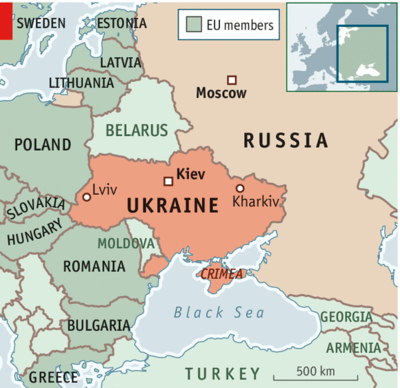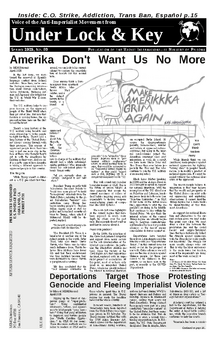
Russia Seizes Crimea in Inter-Imperialist Battle

While opposition to the oligarchy that has ruled Ukraine has united the Western imperialists with Ukrainian fascist parties, austerity measures imposed by the IMF will threaten this alliance shortly. The new offer from the IMF will require hiking energy prices that have been subsidized by the state, one of the deal breakers cited by Yanukovich in November.
The regime change was a loss for Russian economic interests. In response, on 27 February 2014, Russian forces seized control of the Crimean peninsula, a majority Russian region of the current Ukraine state. On 6 March 2014 Crimea’s regional assembly voted to secede from Ukraine and join the Russian Federation. The next day leaders of the Russian Parliament said they would support this move. The decision calls for a referendum for the people of Crimea to vote on this, scheduled for 16 March.(1)
The New York Times has made much of the battle over the right to self-determination in recent strife between the United $tates and the Russian Federation. Struggles in the Black Sea region in recent decades have been primarily inter-imperialist battles, and there is no principle behind the imperialists’ actions except for their economic interests to have access to more markets, natural resources and people to exploit. Meanwhile, the proletariat’s interest is defined by putting an end to this exploitation. Therefore we support the side that most threatens the control and penetration of the imperialists over the oppressed nations.
The Amerikans are saying the Russian invasion of Crimea is totally different from their meddling in Libya, Venezuela, Syria, Iran… just to name a few. But this is all posturing and a question of tactics, and the United $tates often is able to use more subtle tactics because of its greater power. In all cases it is the continuation of imperialist war to maintain profits.
While the situation in Crimea is still unresolved and potentially volatile as we write this, Russian officials have been quoted recognizing Kiev has gone pro-West. At the same time, Russia is talking with the IMF to get in on the Ukraine bail out.(2)
The IMF was part of the Bretton Woods project, which was organized by the imperialist countries after World War II in an attempt to prevent the protectionism and trade barriers that led to the economic crisis in the capitalist core, and drove them to war in both WWI and WWII. Many sanctions and trade barriers are being threatened in the current conflict. But, if Russia is allowed to export some finance capital to Ukraine as part of the imperialist plan for the country, and Russia gets to keep Crimea under its sphere of influence, then a hot war between Russia and the West will likely be averted.
The IMF is basically run by the United $tates, which has 16.75% of the votes. Meanwhile the U.$.-led imperialist camp (U.$., Japan, Germany, France, U.K., Italy and Canada) has 43.74% of votes. Russia has only 2.39%.(3) In addition to the IMF loans, the United $tates has talked of unilateral aid, as long as Ukraine “takes the reforms it needs.”(4) So Russia will see a significant loss in its economic interests in the Ukraine overall, but will likely see a small piece of the pie as serving its interests better than an all out war with the United $tates.
The framework developed at Bretton Woods has been a relatively effective solution to one of the inherent contradictions of the imperialist economic system. However, it does not eliminate inter-imperialist rivalry, it just manages it. While a war on North Amerikan or Western European soils is being avoided at all costs, it is not out of the question. It will certainly come before socialism can reach those lands. War is inherent to imperialism. And it is our position that World War III has been an ongoing low-intensity war against the Third World by the imperialists since the end of WWII.(5) In recent decades this war has been primarily waged by the United $tates. While inter-imperialist war has been secondary in this period, the struggle between different imperialist interests is an antagonistic contradiction that cannot be resolved without ending imperialism. As such conflicts heat up, those in the imperialist countries will be reminded that imperialism does not serve their interests when it comes to the threat of annhilation in war. These conflicts also create breathing room for the oppressed nations to develop their own political interests independent of imperialism. The key to the survival of the humyn species is to develop such movements before the imperialists kill us all.
Related Articles:This article referenced in:








